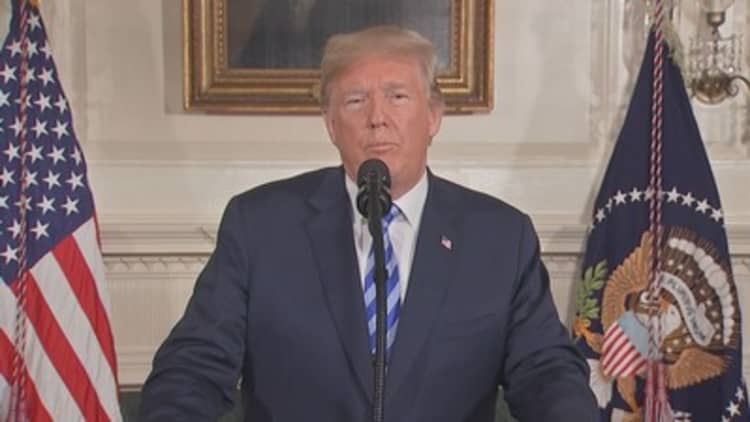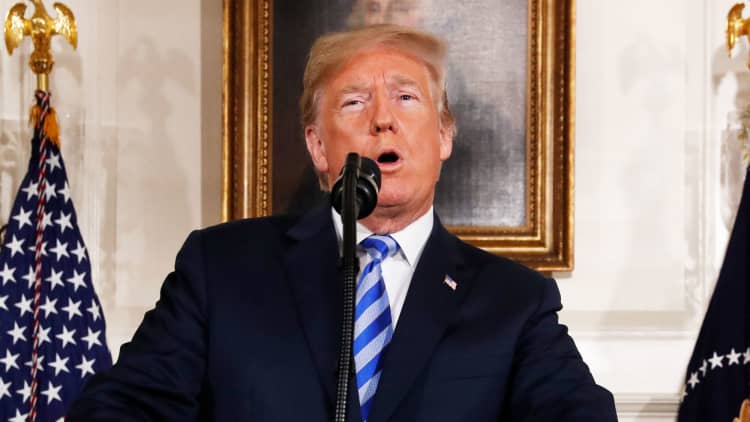
President Donald Trump's decision to pull the U.S. out of the Iran nuclear deal on Tuesday could have widespread global implications ranging from the price of oil to the future of Tehran's nuclear ambitions.
The U.S. withdrawal from the deal could stress already strained diplomatic relations with a number of key allies, including European Union leaders in Germany, France and the United Kingdom, all original parties in the 2015 accord.
President Emmanuel Macron of France and British Foreign Secretary Boris Johnson have both implored Trump in recent days to stay in the landmark deal brokered under President Barack Obama. Macron later tweeted Tuesday his disappointment with Trump's decision to exit the deal, formally known as the Joint Comprehensive Plan of Action.
"France, Germany, and the UK regret the U.S. decision to leave the JCPOA," Macron said in a tweet. "The nuclear non-proliferation regime is at stake."
As part of the original deal, a host of countries, including Russia and China, agreed to periodically suspend sanctions on Iran so long as the Iranians complied with the terms of the deal, including regular international inspections.

But the U.S. departure from the international pact isn't the first time Trump has split with overseas allies or his presidential predecessors. The U.S. ruffled the feathers of European partners earlier this year after Trump approved 25 percent tariffs on foreign steel and 10 percent tariffs on foreign aluminum.
In response, the European Commission said it would respond "firmly" to proposed U.S. import duties, with goods like clothing, orange juice and blue jeans as likely targets.
"We will put tariffs on Harley-Davidson, on bourbon and on blue jeans — Levis," European Commission President Jean-Claude Juncker told German television in March.
"We are here and they will get to know us. We would like a reasonable relationship to the United States, but we cannot simply put our head in the sand."
For his part, Obama weighed in on Trump's decision, saying that the move to pull out is a "serious mistake."
Leaving the deal could also have ripple effects on the oil market, given Iran's role as OPEC's third-largest oil producer. Though Brent crude has posted a sharp rally in recent days on speculation of a withdrawal and tighter supply, the severity of any sanctions could affect how much crude fluctuates in the coming weeks.
Oil prices held lower Tuesday following Trump's announcement, with West texas Intermediate crude settling down $1.67, or 2.4 percent, just above $69; Brent crude slipped 47 cents, or 0.6 percent, to $75.71.
Possibly calming fears, the Treasury Department clarified that the forthcoming sanctions will be reimposed subject to certain 90-day and 180-day wind-down periods.
"President Trump has been consistent and clear that this Administration is resolved to addressing the totality of Iran's destabilizing activities," said Treasury Secretary Steven Mnuchin.
"We will continue to work with our allies to build an agreement that is truly in the best interest of our long-term national security."
Finally, a U.S. exit could leave the future of Iran's nuclear program in limbo. By refusing to waive sanctions without proving that Iran is violating the deal, Trump would effectively drop the agreement made by the United States.
Iran had explored aspects of a nuclear program, including enriching uranium, gathering plutonium and researching methods of bomb-making before the 2015 agreement. Though Tehran contends that its nuclear program was always designed for peaceful purposes, its building of a plutonium reactor in northwestern Iran also drew red flags.
In spite of the U.S. incumbent's threats to withdraw, Iranian President Hassan Rouhani stated that his nation had a plan to counter any move made by Trump when it comes to the deal, Reuters reported. Ahead of the decision, Rouhani said Tuesday that Iran would continue to seek "constructive relations with the world," despite potential sanctions.
WATCH: Israel goes on high alert as Trump quits Iran deal




